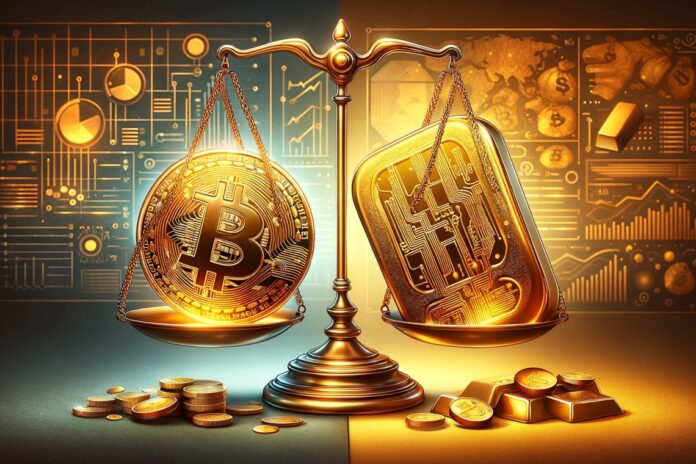Bitcoin has long been considered by many as a digital alternative to gold, and BlackRock’s CEO has also spoken about it.
He talked about the topic during an interview with CNBC a few days ago.
Summary
Bitcoin and gold: the thoughts of BlackRock’s CEO
During the interview on Squawk Box, Larry Fink compared Bitcoin and gold as financial assets.
He said that in the event of market fear due to geopolitical risks, the price of gold tends to rise in the markets, and he believes that Bitcoin could do the same.
He has also explicitly stated that it is an asset class that protects.
However, it has also highlighted an important difference.
In fact, gold is continuously extracted, so much so that its supply continues to grow. Instead, Bitcoin has a fixed maximum supply, and in its 15 years of existence, more than 93% of all BTC that will ever exist have already been mined.
From Larry Fink’s words emerges a consideration of Bitcoin as a possible financial alternative to gold, but with some differences. So not exactly a digital version of gold, but a financial alternative to gold investments.
The ETFs
It should be remembered that in financial markets investments in gold are primarily made through ETFs, and that Larry Fink’s interview on CNBC took place the day after the launch of the Bitcoin spot ETFs on the US stock exchanges, including BlackRock’s.
It is highly likely that the CEO of BlackRock’s intention during that interview was to promote their Bitcoin spot ETFs, which indeed have achieved great success.
In just six trading sessions, the iShares Bitcoin ETF (IBIT), which is a subsidiary of BlackRock responsible for issuing and managing ETH, has reached and surpassed a market capitalization of $1.3 billion, owning over 33,000 BTC.
It was therefore a very successful launch, probably also thanks to the advertising of BlackRock.
BlackRock and Larry Fink
BlackRock is the world’s largest asset manager, with AUM of over $9.4 trillion.
It is a company based in New York, founded in 1988 by Larry Fink himself along with Robert S. Kapito and Susan Wagner, as well as Barbara Novick, Ben Golub, Hugh Frater, Ralph Schlosstein, and Keith Anderson.
The goal was to specifically provide institutional clients with wealth management services, particularly from a risk management perspective.
The iShares Physical Gold ETC (SGLN) by BlackRock has an AUM of 13 billion dollars, and it is the second largest gold ETF in the world in terms of AUM, just behind Invesco Physical Gold A (SGLD) which has an AUM of almost 13.7 billion dollars.
Larry Fink is now 71 years old, but he has always been an innovator in the financial field. It is therefore not surprising that he is so attentive and interested in the evolution of Bitcoin, especially as an investment asset.
BlackRock, Bitcoin and the comparison with gold
Note that the world’s largest ETF by AUM, Grayscale’s GBTC, debuted on the stock exchange with an AUM of over $30 billion, which is more than SGLN and SGLD combined.
As of today, it is worth less than 22 billion dollars, due to strong collateral liquidations (BTC), while the other two major Bitcoin ETFs (BlackRock’s IBIT and Fidelity’s FBTC) together barely exceed 2.5 billion dollars.
However, the price of BTC is much more volatile than that of gold, so it becomes difficult to make this kind of comparison with specific values. It would probably be better to make them using current average values, and the average values of 2023 were definitely favorable to gold.
BlackRock is pushing hard on its Bitcoin ETF, not only because it obviously wants to promote its sale, but probably also because it is trying to convince their institutional clients to consider the possibility of including it in their portfolio, perhaps with a small share.
The hypothesis seems to be that the company advises to have in its portfolio both gold ETFs and Bitcoin ETFs, precisely because they are similar but with some differences.
However, while for gold ETFs we are talking about a portfolio share that is already at least minimally significant, when it comes to Bitcoin ETFs we are talking about a truly minimal share.
Despite this, experts expect that Bitcoin ETFs will be able to attract hundreds of billions of new capital in the next two or three years, also in view of the probable future launch of similar products on Chinese exchanges.




